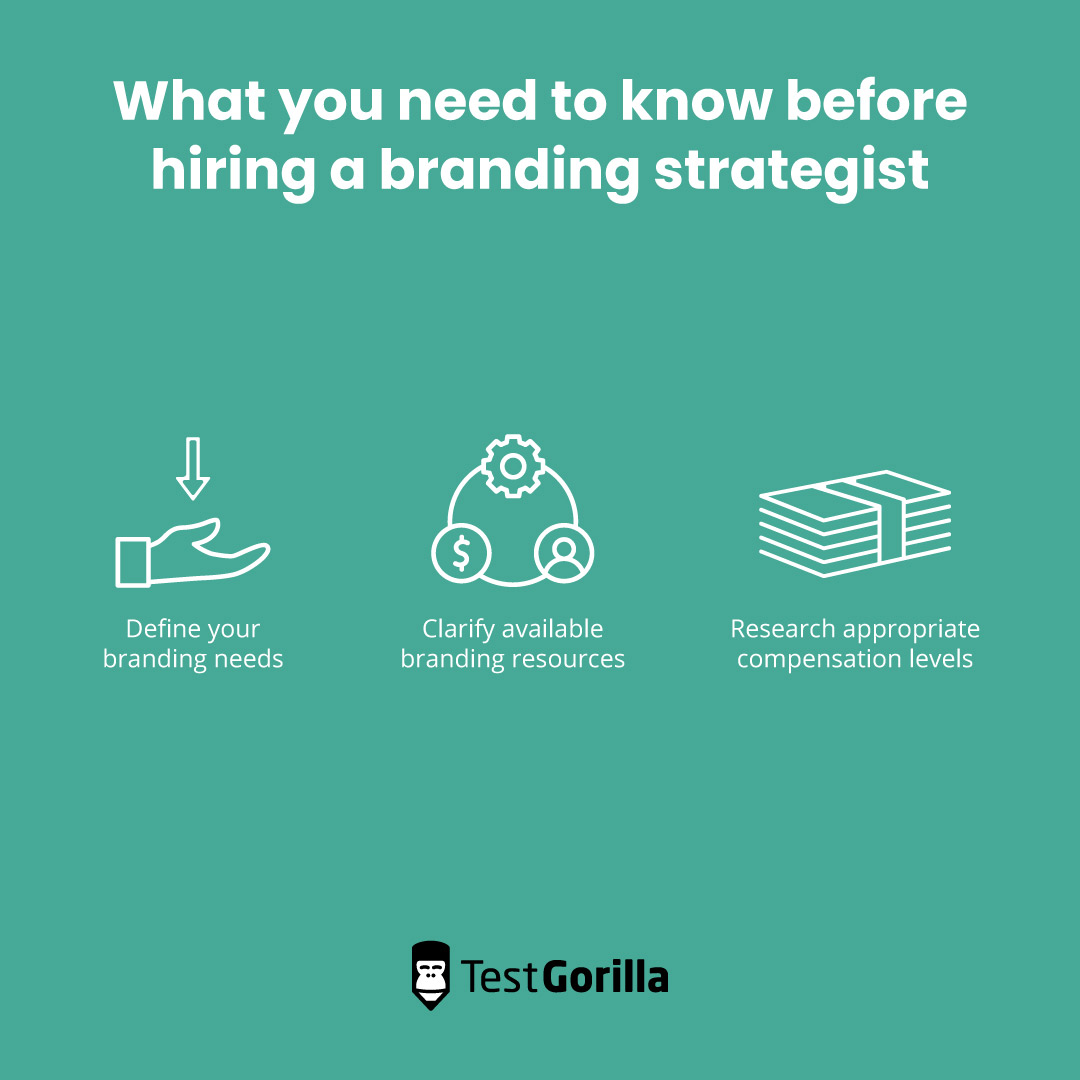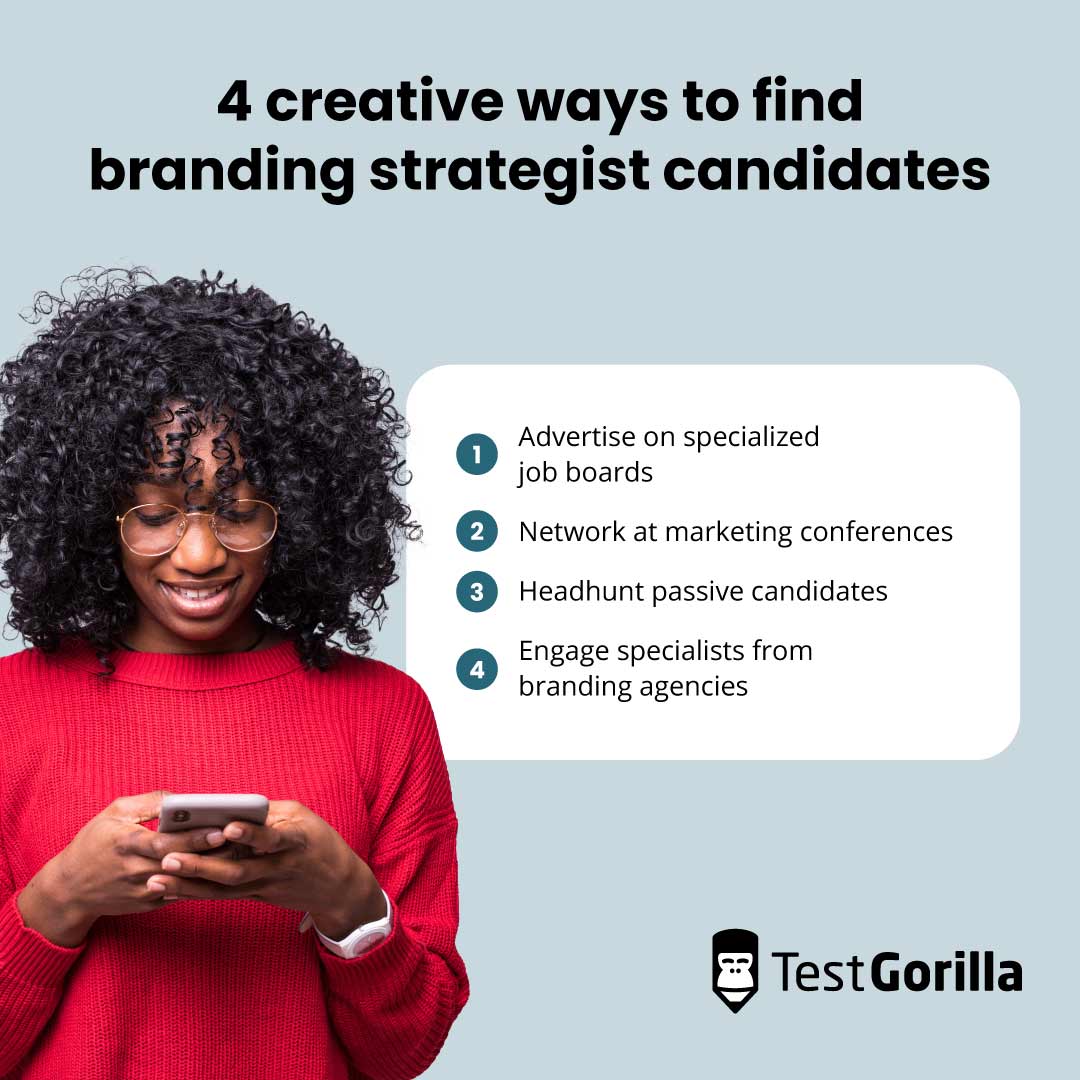A memorable brand is crucial to make you stand out from the competition—and this is where the branding strategist shines. They analyze your market and develop effective strategies to create a unique perception of your brand in customers’ minds. However, recruiting the wrong person for the job could damage both your brand and your team’s cohesion.
To hire a great branding strategist, you need to know which skills are essential, such as market analysis and communication, and where to find the best candidates.
In this guide, we outline the core skillset of branding strategists, creative ways to source talent, and how to identify your top candidates using tests such as those offered by TestGorilla.
Table of contents
- What you need to know before hiring a branding strategist
- Skills and qualifications to look for in a branding strategist
- Where to find skilled branding strategists
- How to select the best branding strategist candidates
- Common mistakes when hiring a branding strategist
- Identify skilled branding strategists with TestGorilla
What you need to know before hiring a branding strategist
Apply these best practices to ensure a smooth recruitment process.
Define your branding needs
Brand strategy responsibilities can vary between companies and projects. For example, maintaining an existing brand requires a different set of skills compared with re-branding it. So ensure you clearly define the types of branding projects the strategist is likely to undertake.
Furthermore, consider your audience type—business or consumer—and the industry you’re in. Do you want the branding strategist to have prior experience in your target market or to come in with fresh perspectives from a different background?
Answering these questions will make your branding strategist job description more attractive to suitable applicants and help you select top candidates.
Clarify available branding resources
To perform their role well, branding strategists require certain resources, such as market research, brand guidelines, and defined processes. Specialist team members, like graphic designers and copywriters, are also important for executing branding strategy tasks.
Take note of the resources your prospective brand strategist will be able to avail of and make these clear to candidates throughout the recruitment process, from job description to interview stage. This ensures that only candidates who can work with—or without—those resources advance.
Research appropriate compensation levels
It’s important to investigate what appropriate compensation in your industry looks like. Start by checking average pay rates on job sites while filtering by job title, seniority, location, and industry.
For example, Glassdoor places brand strategists’ base pay between $60K and $96K, while Indeed places it between $47k and $146k. You can then go deeper by reviewing specific job ads from your industry with comparable seniority levels to your role.
Collect and average these employers’ pay offers to reach a more specific pay range for your role, say, $60K–$70K for a mid-level brand strategist in your industry. You can meet or even exceed this range by 10-20% to remain competitive.
Consider including benefits and perks, too. Indeed, it is through these that you can brand yourself as an employer. You could include paid time off (PTO) and healthcare benefits in your job description, along with perks such as access to well-being apps, gym passes, and gift cards.
Skills and qualifications to look for in a branding strategist
You don’t need to request special qualifications for your branding strategists, though a Bachelor’s degree and previous work experience in branding could help. You could also scout for transferrable marketing skills, such as target audience research, or relevant experience in an agency or consultancy environment.
Here are the hard and soft skills you should evaluate throughout the hiring process.
Hard skills
Market research: Drawing insight from customer needs, industry trends, and competitor branding
Brand positioning: Clearly defining the company’s unique value proposition (USP) for target audiences, using branding elements such as logo, copy, brand voice, and PR
Data analysis: Evaluating strategy effectiveness by analyzing audience engagement on key channels like social media
Rebranding: Understanding the unique challenges and risks of changing an organization’s brand identity
Project management: Effectively executing a branding strategy project, including setting objectives, managing timelines, and co-ordinating stakeholders
Brief development: Writing clear briefs for branding collateral, including graphic design, social media content production, and PR communications.
Soft skills
Critical thinking: Breaking down problems and using logical reasoning to identify solutions
Creativity: Approaching branding tasks with an open mind to develop original strategies
Attention to detail: Identifying errors and patterns in both visual and textual branding collateral, such as logos, ads, and webpages
Communication: Pitching branding strategies to senior staff while clearly communicating tasks to coworkers
Empathy: Making strategic decisions while seeing the brand from the customer’s perspective
The best insights on HR and recruitment, delivered to your inbox.
Biweekly updates. No spam. Unsubscribe any time.
Where to find skilled branding strategists
Branding strategists have a niche skillset, so you need to carefully select which platforms to advertise your role on. Generalist job boards like Indeed and LinkedIn are a start, but they may connect you to applicants without first-hand branding experience
To cast a narrower net and target experienced branding strategists, give these alternative methods a go.
4 creative ways to find branding strategist candidates
1. Advertise on specialized job boards
Try posting your job description on specialized marketing job boards like Marketing Hire and the American Marketing Association (AMA) for a more targeted approach. Branding specialists may also job-hunt on boards dedicated to digital and creative skills such as Hire Digital, Dribble, and Behance.
On top of posting your job opening, take an active approach and scan these specialized sites for branding professionals with the right skills and experience mix. You can then send them personalized messages inviting them to submit a job application.
2. Network at marketing conferences
At marketing conferences, you’ll meet ambitious branding strategists—or marketers with branding strategy experience—who are focused on their career growth. Network with both attendees and speakers that convey original ideas about branding in an engaging way. Events such as Brand Insider Summit, Reuters’ Strategic Marketing, and DigiMarCon are particularly good ones to attend.
Conference networking is primarily a long-term talent pipeline, since many of your new contacts will be happy in their existing jobs. However, nurturing these connections could mean getting qualified candidates when they’re ready for a new role.
3. Headhunt passive candidates
Passive candidates, such as employed professionals who aren’t actively job-hunting, could be a strong fit for your opening. But that doesn’t mean you can’t convince them to join your company. There are a few ways to headhunt them, including asking recruitment agencies to do it for you.
Another fruitful option, which saves you agency fees, is headhunting on networking platforms like LinkedIn.
On LinkedIn, search for individuals located near the main site of the position you want to fill (unless it’s remote) and filter results by seniority level and past responsibilities. Be sure to include the keyword “branding.” When you find an interesting prospect, you can discreetly check if they’d be interested in a new challenge.
4. Engage specialists from branding agencies
Another solution is indirectly hiring a branding strategist through a creative agency. While they’re legally a contractor, they perform the same set of responsibilities as an employed worker.
The advantage of this method is that the branding professional is trained and monitored by their agency, saving you time. Also, it’s much easier not to renew a supplier contract than it is to fire an employee if results aren’t as expected.
That said, depending on the agency and the agreed number of working hours, you could end up spending more via this route than if you hired in-house.
How to select the best branding strategist candidates
Here are the top strategies to find top-quality candidates with a skills-based approach.
Use one-way video interviews
One-way video interviews let you remotely evaluate branding strategists’ knowledge, work experience, and communication skills before you schedule a one-on-one interview.
One-way interview providers like TestGorilla let you use templates or customize your own questions for a bespoke assessment. Candidates receive a personalized invitation and are asked to record their answers within a specified time limit. Then, your team can watch and collaboratively score responses before shortlisting the interviewees.
Ask scenario-based questions
Scenario-based questions are interview questions that test candidates using a real-world problem. Typically, they start with “What would you do if…”, inviting interviewees to expand on their approach in the given situation.
For example, you could ask:
What are the first three steps you would take if we asked you to re-brand our business?
Imagine our company is expanding into a new market in [Insert world region]. How would you establish a successful brand image in the new market?
Such questions help you identify top candidates by testing hard and soft skills like critical thinking, brand positioning, communication, and project management.
Use skills-based talent assessments
Talent assessments offer an unbiased, skill-based way to select the best candidates from your applicant pool. TestGorilla lets you combine up to five customizable tests per assessment, so you can test branding strategists on the skills, traits, and abilities most relevant to your role.
You could, for instance, evaluate branding strategists using TestGorilla’s:
Job-specific tests, such as on branding strategy, market analysis, and marketing analytics
Cognitive ability tests—for example, on critical thinking
Situational judgment tests like those testing communication abilities
Personality tests like DISC and Enneagram assessments
Common mistakes when hiring a branding strategist
Avoid these common pitfalls to ensure you make the best hiring decision.
Prioritizing hard skills over soft ones
Specialist knowledge and experience are essential to a branding role, but don’t let that overshadow the value of soft skills. For instance, an employee with great market research ability and poor communication skills won’t be able to effectively influence their senior leadership team.
So, from preparing a job description to interviewing and assessing job skills, make sure you assess soft and hard skills equally.
Not testing real-world experience
You may be blown away by a candidate’s resume and how they describe their previous projects. But if you don’t test job-specific skills and experience, you may accidentally hire a candidate who’s better at explaining tasks than performing them.
To avoid this, add online assessments and scenario-based interview questions to your process. These can indicate if your candidates are prepared to solve real-world problems in your business.
Ignoring branding resource availability
Top-notch branding strategists will want to know what resources they’ll have at their disposal, from specialist coworkers to established processes and branding materials. If you don’t clarify these, suitable candidates may refuse your job offer or not apply at all.
This is because they may assume they’ll be expected to execute tasks outside the role description. It’s essential, therefore, to clearly communicate what they’re expected to do and not.
Identify skilled branding strategists with TestGorilla
Hiring the wrong branding strategist could negatively affect your team’s workflows and customers’ perception of your business. So it’s essential to target and attract people with the skills to help your business succeed.
Getting an overall picture of your branding strategist candidates’ skills, traits, and abilities is crucial to making an unbiased, data-driven hiring decision. To this end, you can use TestGorilla’s talent assessments to evaluate job-specific skills, cognitive ability, personality traits, and more. Also, our one-way video interview feature enables you to ask scenario-based questions while evaluating communication skills.
To find out more, schedule a free live demo with our friendly team or watch a pre-recorded product tour now.
Ready to build your first talent assessment? Join TestGorilla for free today.
You've scrolled this far
Why not try TestGorilla for free, and see what happens when you put skills first.




















